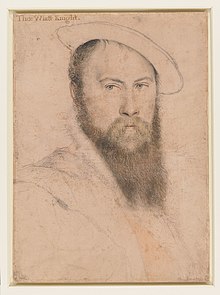
Back توماس ويات Arabic توماس ويات ARZ Томас Уайът Bulgarian Thomas Wyatt Catalan Thomas Wyatt (básník) Czech Thomas Wyatt Welsh Thomas Wyatt (Dichter) German Τόμας Ουάιατ (ποιητής) Greek Thomas Wyatt (poeto) Esperanto Thomas Wyatt Spanish
Thomas Wyatt | |
|---|---|
 Depiction by Hans Holbein the Younger | |
| Born | Thomas Wyatt 1503 Allington Castle, Kent, England |
| Died | 11 October 1542 (aged 38–39) Clifton Maybank House, Dorset, England |
| Resting place | Sherborne Abbey, Dorset |
| Alma mater | St John's College, Cambridge |
| Occupation(s) | Stateman, poet |
| Known for | First modern English writer |
| Title | Ambassador of England High Sheriff of Kent Knight of the shire for Kent |
| Spouse | Elizabeth Brooke |
| Children | Sir Thomas Wyatt the Younger Henry Francis Edward |
| Parent(s) | Sir Henry Wyatt Anne Skinner |
| Writing career | |
| Language | Early Modern English |
| Period | High Renaissance |
| Genres | |
| Literary movement | English Renaissance, Petrarchism |
Sir Thomas Wyatt (1503 – 11 October 1542)[1] was a 16th-century English politician, ambassador, and lyric poet credited with introducing the sonnet to English literature. He was born at Allington Castle near Maidstone in Kent, though the family was originally from Yorkshire. His family adopted the Lancastrian side in the Wars of the Roses. His mother was Anne Skinner, and his father Henry, who had earlier been imprisoned and tortured by Richard III,[2] had been a Privy Councillor of Henry VII and remained a trusted adviser when Henry VIII ascended the throne in 1509.
Thomas followed his father to court after his education at St John's College, Cambridge. Entering the King's service, he was entrusted with many important diplomatic missions. In public life, his principal patron was Thomas Cromwell, after whose death he was recalled from abroad and imprisoned (1541). Though subsequently acquitted and released, shortly thereafter he died. His poems were circulated at court and may have been published anonymously in the anthology The Court of Venus (earliest edition c. 1537) during his lifetime, but were not published under his name until after his death;[3] the first major book to feature and attribute his verse was Tottel's Miscellany (1557), printed 15 years after his death.[4]
- ^ Cummings, Brian (2006). "Thomas Wyatt". In Kastan, David Scott Kastan (ed.). The Oxford Encyclopedia of British Literature. Oxford: Oxford University Press. p. 346. ISBN 9780195169218.
- ^ Chisholm 1911, p. 861.
- ^ Huttar 1966
- ^ Shulman 2011, p. 353
© MMXXIII Rich X Search. We shall prevail. All rights reserved. Rich X Search